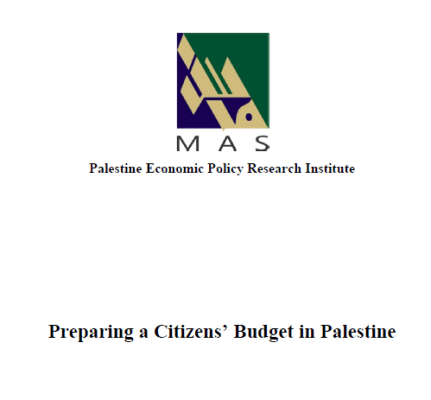Preparing a Citizens’ Budget in Palestine
Among its numerous objectives, the Palestine Economic Policy Research Institute (MAS) is much concerned with promoting societal awareness of economic and social development issues that affect people’s lives and their well-being. MAS also stresses the need to strengthen the values of dialogue, governance, oversight and transparency in order to guarantee the rights of citizens to know the sources of funding and spending vis-à-vis public financing, as well as their rights to participate in formulating future spending trends and priorities, in association with central and local authorities. This study aims to illustrate approved global practices in terms of preparing citizens’ budgets on what is publically disseminated to citizens of Palestine. This paves the way for presenting a set of recommendations and policies that enhance the process of preparing citizens’ budgets, their dissemination and their sustainability. As such, the citizens’ budget becomes a participatory tool between the citizen, the central government and local governance units in terms of preparing public policies and spending priorities, while formulating these in proportion to developmental needs. The significance of this paper is that it sheds light on citizens’ budget as a tool for raising awareness and educating citizens on issues of revenues, expenditures and sources of funding.
The study demonstrates that the citizens’ budgets of the Palestinian central government have achieved most of the requirements of best practices listed in performance indicators (introductory criteria), except for financial risks that the state may be exposed to.
All citizens’ budgets at responsible authorities and local governance units were limited to achieving the purpose of publication. However, they did not include an explanation of participatory goals in preparing and publishing such budgets. Moreover, all versions of citizens’ budgets issued by the ministries of Social Development and Education and Higher Education covered all criteria listed in performance indicators (social protection and gender responsiveness criteria). However, not all citizens’ budgets fulfilled the criteria of timing, continuity and commitment in performance indicators, nor the criteria of involving NGOs, federations, unions, associations or citizens as listed in performance indicators (participation criteria). Furthermore, not all citizens’ budgets were committed to achieving performance indicators (outreach criteria).
The study stresses the necessity of providing a legal framework for issuing a citizens’ budget (within the parameters of the law on financial affairs and budget preparation, and/or within the Palestinian financial system). It also highlights the need to detail administrative accountability in terms of naming employees charged with preparing citizens’ budgets at ministries and local authorities at the finance unit within responsible authorities. It also recommends strengthening cooperation and coordination between responsible authorities and relevant donors, in order to develop programs and websites specialized in publishing, analyzing and studying citizens’ budgets, while preparing guidelines for preparing, publishing and publicizing such budgets. Additional recommendations include providing a permanent observatory to follow-up, study and analyze budgets, as well as raising special recommendations for developing budget management policies and mechanisms.
MAS extends its sincere thanks to distinguished research staff for their efforts in preparing this important study. MAS also thanks the United Nations Development Program (UNDP-PAPP) for funding this study within the framework of the Transparency, Evidence and Accountability Program (TEA/UNDP), funded by the British Foreign, Commonwealth and Development Office (FCDO).

